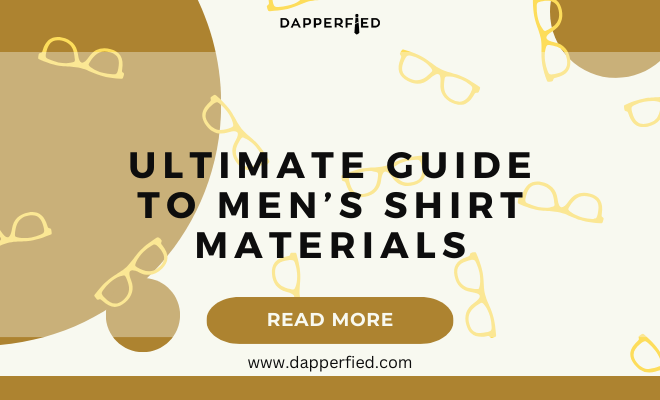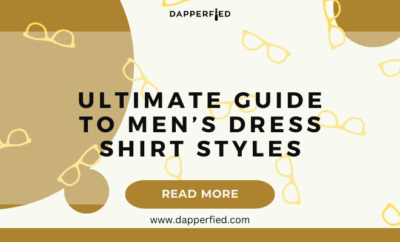
Men's Style
Ultimate Guide to Men’s Shirt Materials
When it comes to choosing the right shirt, the material is a crucial factor to consider. Different shirt materials offer various benefits and drawbacks, and understanding them can help you make an informed decision. From natural fibers like cotton, linen, silk, and wool to synthetic materials and blends, each fabric has its unique characteristics that cater to different needs and preferences. By understanding the properties of each material, you can select the perfect shirt for any occasion, climate, or personal style.
Key Takeaways
- Cotton is the most common shirt material, known for its breathability and versatility.
- Linen is a lightweight and breathable option, perfect for hot weather and casual wear.
- Silk is a luxurious choice for dress shirts, known for its smooth texture and elegant appearance.
- Wool is a warm and durable fabric, ideal for winter shirts and cold weather.
- Synthetic materials offer a low-maintenance option for shirts, often with added stretch and wrinkle resistance.
- Blends combine the best qualities of different materials, offering a balance of comfort, durability, and easy care.
Cotton: The Most Common Shirt Material
Cotton is the most popular shirt material for a reason. It is breathable, soft, and comfortable, making it an excellent choice for everyday wear. Cotton shirts are versatile and can be worn in various settings, from casual to formal. The natural fibers of cotton allow air to circulate through the fabric, making it ideal for warm weather. Additionally, cotton is easy to care for and can be machine washed, making it a low-maintenance option for busy individuals. However, pure cotton shirts may wrinkle easily and may not be as durable as other materials. To address this, some cotton shirts are blended with other fabrics to enhance their wrinkle resistance and durability.
Cotton is a natural fiber that is known for its breathability and comfort. It is a popular choice for shirts due to its versatility and ease of care. Cotton shirts are suitable for various occasions and climates, making them a staple in many wardrobes. However, pure cotton shirts may wrinkle easily and may not be as durable as other materials. To address this, some cotton shirts are blended with other fabrics to enhance their wrinkle resistance and durability.
Linen: The Lightweight and Breathable Option
Linen is a lightweight and breathable fabric that is perfect for hot and humid climates. It is made from the fibers of the flax plant and is known for its natural luster and crisp texture. Linen shirts are highly absorbent and wick moisture away from the body, making them an excellent choice for summer wear. The loose weave of linen allows air to flow through the fabric, keeping the body cool and comfortable. While linen shirts are prone to wrinkling, many people appreciate the relaxed and casual look that comes with the fabric’s natural creases. Additionally, linen becomes softer and more comfortable with each wash, making it a favorite choice for those who prioritize comfort and breathability.
Linen is a lightweight and breathable fabric that is perfect for hot and humid climates. It is highly absorbent and wicks moisture away from the body, making it an excellent choice for summer wear. While linen shirts are prone to wrinkling, many people appreciate the relaxed and casual look that comes with the fabric’s natural creases. Additionally, linen becomes softer and more comfortable with each wash, making it a favorite choice for those who prioritize comfort and breathability.
Silk: The Luxurious Choice for Dress Shirts
| Attribute | Value |
|---|---|
| Material | Silk |
| Comfort | High |
| Durability | Medium |
| Price | High |
| Appearance | Luxurious |
Silk is a luxurious and elegant fabric that is often associated with formal wear. It is made from the fibers produced by silkworms and is known for its smooth texture and natural sheen. Silk shirts are lightweight, soft, and incredibly comfortable to wear. The fabric drapes beautifully on the body, giving it a sophisticated and refined look. Silk is also a highly breathable material, making it suitable for both warm and cool weather. However, silk shirts require special care and maintenance, as they are delicate and can be easily damaged by heat or moisture. Despite the high maintenance, silk shirts are a timeless choice for dressy occasions and can elevate any outfit with their luxurious feel and elegant drape.
Silk is a luxurious and elegant fabric that is often associated with formal wear. It is known for its smooth texture and natural sheen, giving it a sophisticated and refined look. Silk shirts are lightweight, soft, and incredibly comfortable to wear. The fabric drapes beautifully on the body, making it a timeless choice for dressy occasions.
Wool: The Warm and Durable Fabric for Winter
Wool is a natural fiber that is known for its warmth and durability, making it an excellent choice for winter shirts. It has excellent insulating properties that help regulate body temperature in cold weather, keeping you warm and comfortable. Wool shirts are also highly durable and resistant to wrinkles, making them a practical option for everyday wear. Additionally, wool has natural moisture-wicking properties that help keep the body dry and comfortable in various weather conditions. While wool shirts may require special care when washing, their warmth, durability, and versatility make them a valuable addition to any wardrobe, especially during the colder months.
Wool is a natural fiber that is known for its warmth and durability, making it an excellent choice for winter shirts. It has excellent insulating properties that help regulate body temperature in cold weather, keeping you warm and comfortable. Wool shirts are also highly durable and resistant to wrinkles, making them a practical option for everyday wear.
Synthetic Materials: The Low-Maintenance Option

Synthetic materials like polyester, nylon, and spandex offer several benefits that make them a popular choice for shirts. These fabrics are often blended with natural fibers to enhance their performance and durability. Synthetic shirts are known for their low-maintenance qualities, as they are resistant to wrinkles, shrinking, and fading. They also dry quickly and are highly durable, making them suitable for active wear or travel. Additionally, synthetic materials offer stretch and flexibility, providing comfort and ease of movement throughout the day. While some people may prefer natural fibers for their breathability and sustainability, synthetic materials have their place in the market due to their practicality and performance.
Synthetic materials like polyester, nylon, and spandex offer several benefits that make them a popular choice for shirts. These fabrics are often blended with natural fibers to enhance their performance and durability. Synthetic shirts are known for their low-maintenance qualities, as they are resistant to wrinkles, shrinking, and fading.
Blends: The Best of Both Worlds
Blended fabrics combine the best qualities of different materials to create shirts that offer enhanced performance and comfort. Common blends include cotton-polyester, linen-cotton, wool-silk, and more. By blending different fibers together, manufacturers can create shirts that are wrinkle-resistant, breathable, durable, and easy to care for. Blended shirts also tend to be more affordable than pure natural fiber shirts while still offering many of their benefits. Whether you’re looking for a shirt that is easy to care for or one that offers the best of both natural and synthetic materials, blended fabrics provide a versatile option that caters to various needs and preferences.
Blended fabrics combine the best qualities of different materials to create shirts that offer enhanced performance and comfort. Common blends include cotton-polyester, linen-cotton, wool-silk, and more. By blending different fibers together, manufacturers can create shirts that are wrinkle-resistant, breathable, durable, and easy to care for.
If you’re interested in learning more about men’s fashion, you should check out this article on how to rock designer suits. It offers great tips on how to style and wear designer suits for men. It’s a great complement to understanding men’s shirt materials and how they can elevate your overall look.

FAQs
What are the most common materials used for men’s shirts?
The most common materials used for men’s shirts are cotton, linen, polyester, and blends of these materials.
What are the characteristics of cotton shirts?
Cotton shirts are known for their breathability, softness, and durability. They are comfortable to wear and can be easily cared for.
What are the characteristics of linen shirts?
Linen shirts are lightweight, breathable, and have a natural texture. They are ideal for warm weather and have a relaxed, casual look.
What are the characteristics of polyester shirts?
Polyester shirts are known for their wrinkle resistance, durability, and quick-drying properties. They are often used in performance or athletic shirts.
What are the benefits of shirt materials blends?
Shirt material blends combine the benefits of different materials, such as the breathability of cotton and the wrinkle resistance of polyester. Blends can offer a balance of comfort and practicality.
How should I care for different shirt materials?
Cotton and linen shirts can typically be machine washed and dried, while polyester shirts may require special care to maintain their shape and properties. Always check the care label for specific instructions.














